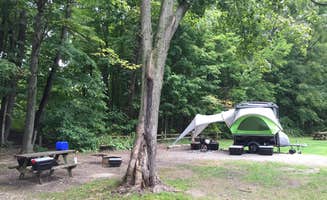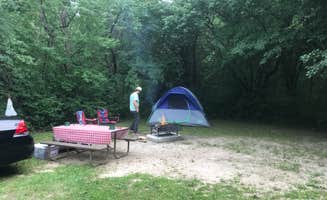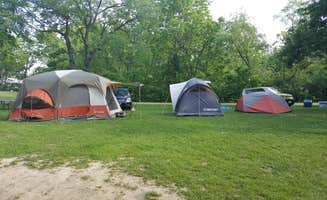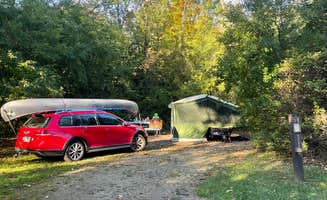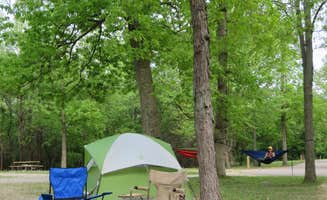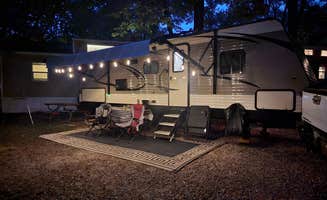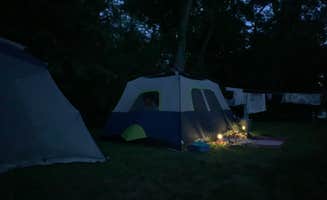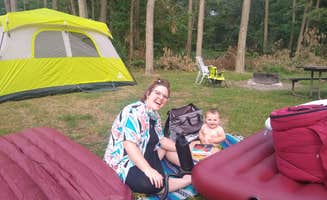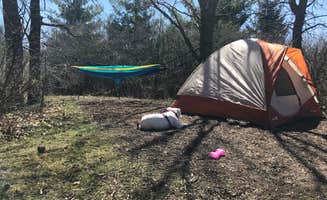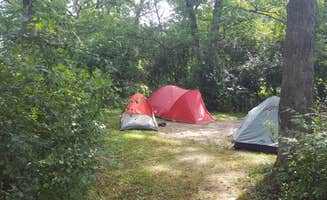Lake Villa, Illinois camping areas sit within a web of glacially-formed lakes at approximately 750 feet elevation. The region's climate delivers humid summers with temperatures typically reaching 80-85°F and mild springs with nighttime temperatures dropping to 40-50°F. Most non-electric campsites in the area range from $12-25 per night, while electric sites typically cost $25-30 per night.
What to do
Kayaking through connected waterways: Chain O'Lakes State Park offers an extensive network of waterways perfect for paddling. "I love to kayak through here because I don't need to paddle through the river unless I'm feeling competitive. I enjoy this route for the wildlife and nature scenery. I've seen beavers, minks, ferrets, and sand cranes on my two trips so far," notes a visitor to Turner Lake South.
Horseback riding: Several campgrounds offer trail riding opportunities. "There is horse riding here as well. The views are breathtaking," mentions a camper at Mud Lake East. For those without their own horses, guided rides are available at some locations.
Winter activities: While most camping occurs from May through October, several parks maintain winter access. Richard Bong State Recreation Area offers snowmobile trails when conditions permit, and many parks allow winter hiking on designated paths with proper traction equipment.
What campers like
Privacy between campsites: Many campers value secluded spots. At Prairie View, one visitor noted, "Our campsite was encased in foliage which gave us some privacy. I could see through the brush to neighbors but it was enough to give my dog a sense of peace without disturbances."
Wildlife viewing opportunities: The wetland environment supports diverse wildlife. At Sunset Campground in Richard Bong State Recreation Area, a camper observed, "It's a wetland, mosquitoes are happening, but the trade off is just about worth it. If you enjoy bird watching or rabbit spotting, this is a great place to go...I have seldom seen as many rabbits as we saw."
Fishing accessibility: Many sites offer shoreline fishing access. "The lake was very nice. We were able to kayak but be careful getting the kayaks in. Stairs down to the pier and the bottom of the lake is very mushy. The water was very clear and you could see the fish swim by," shares a visitor at Turner Lake South.
What you should know
Weather considerations: The region experiences significant seasonal variations. "We stayed in the Turner lake south loop, which has nice and private sites... sites had gravel and roots so tent spot took some searching and clearing to find," explains a camper about site preparation requirements.
Insect preparation: Given the waterfront locations, insects are prevalent. "SO many ticks. With a baby crawling that needed to be set free, we were constantly doing checks," warns a visitor at Honeysuckle Hollow. Bug spray with DEET is recommended during summer months.
Wildlife management: Local wildlife requires proper food storage. "The raccoons at night here are no joke. The second it's dusky, they come scavenging for absolutely anything food has touched. So basically, eat dinner and do s'mores early, then everything must be packed into cars for the night and all surfaces wiped down," advises a Honeysuckle Hollow camper.
Tips for camping with families
Best sites for children: Look for specific loops with child-friendly amenities. "We chose the loop 11 was on because it was close to the path to the playgrounds and lakes plus bathrooms...avoid the first 2 sites from either end as the ones closest to the main loop aren't very deep. Closer to the center of this row is best," recommends a family at Honeysuckle Hollow.
Budget-friendly options: Some campgrounds offer affordable camping for families. At Turner Lake South, a visitor highlighted, "These campsites are as low as $12/night!! One of my favorite spots to test new gear. Family friendly. There's some small trails around as well that are beginner."
Contained play areas: For younger children, consider sites with screen enclosures. "Luckily our screen house pop up on a tarp that was sprayed ahead for tick repellent plus a blanket on top of that did the trick, but they literally fall out of the trees into people! Plan for toddlers and babies to have a contained covered screen house," advises a parent from Honeysuckle Hollow.
Tips from RVers
Electric site selection: Some campgrounds have better electric site layouts than others. "Fox Den is superior to Honeysuckle Hollows because each site has an individual electric post. Sites in Honeysuckle have electric posts too far from parking pad. Fox Den also has more space between sites, more level pads and each site is tucked away with trees," explains an RVer at Fox Den Campground.
Off-season advantages: Weekdays and shoulder seasons offer better availability. "The campground was really busy during the weekend, but cleared out Sunday and we nearly had the whole loop to ourselves during the week," shares a visitor at Honeysuckle Hollow who stayed for a week during summer.
Dump station timing: Plan dump station use strategically. "Since there's no full hookup, they needed someone to control the traffic that comes from two different directions going to the dual dump stations. There's no honor system, especially on a holiday weekend," notes an RVer, highlighting potential wait times during peak checkout periods.


